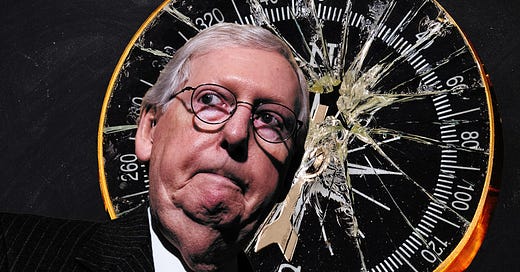[In an MSNBC appearance on April 8, 2022, Tim Miller discussed Mitch McConnell’s political-moral framework. This came in the wake of an interview in which Jonathan Swan asked the Senate majority leader where McConnell draws “moral red lines” and about the apparent contradiction between his Feb. 13, 2021 statement about Trump being responsible for the Jan. 6th insurrection and his subsequent statements saying he would support Trump if the Republican party nominates him again for president. Miller’s remarks are transcribed below.]
https://twitter.com/deadlinewh/status/1512558504875376652?s=21&t=msyEWMq3jjd2gXcH3frRJA I want to, if you don’t mind, try to step back and try to explain Mitch McConnell and maybe look at his February 13th remarks in a little bit of a different context. Look, throughout all of history, anybody in politics has to balance their values, their moral beliefs with what they believe is politically expedient. And at times those things are in conflict, right? This is politics. Politics ain’t beanbag, as they say. And at times people decide to do what's politically expedient versus what they think is morally correct. No matter your party. Look at Mitch’s predecessor, Harry Reid. When he lied about Mitt Romney's tax returns, he wasn’t thinking about the morals, he was thinking about what was politically expedient at that time. What Jonathan's interview with Mitch revealed is that Mitch McConnell is a category difference from all of those other politicians. Mitch McConnell does not try to balance—at all—the moral values that he may or may not have with what is politically expedient. https://www.youtube.com/watch?v=Z4zA3GOld5w&t=2s What he believes is that whatever is politically expedient is moral. . . . What he said is actually not a contradiction because on February 13th, what he thought was politically expedient for his party was to signal to swing voters, to signal to the remaining Republicans with a conscience that this party is not all thrown in with the domestic terrorists, with the people that are responsible for the deaths at the Capitol. Two weeks later, when the politics began to change, what he was doing was signaling to MAGA voters that they shouldn’t break up the party, that they could stick with him—that at the end of the day, he’ll do whatever the MAGA voters want him to do just as he has the last five years. And so for Mitch McConnell, his actions were consistent because his whole moral framework is whatever I need to do to advance my power and my party’s power right now is the moral thing. And, why that interview is so important, why Jon's interview is so important is because Mitch is winning that argument right now. In all of Republican Washington and many Republican voters, they live in this bubble where, in the post-Trump era, they don’t consider the morals anymore. They’ve decided that owning the libs is the most important thing, is the highest and best purpose. And so by asking that question, Jonathan kind of removed him [McConnell] from that bubble and from that moral framework in which he had to kind of think about this and answer a question: Do I have any morals that supersede politics? And the answer was that does not compute for Mitch McConnell. You could just see it. You just see him shaking his head. He couldn’t, he honestly, almost couldn’t even understand Jonathan’s question. He was befuddled. Because for him, what is politically right is what is moral, and that was tested on Jan. 6th. He saw the deaths at the Capitol and he still said, meh, I don’t care.











